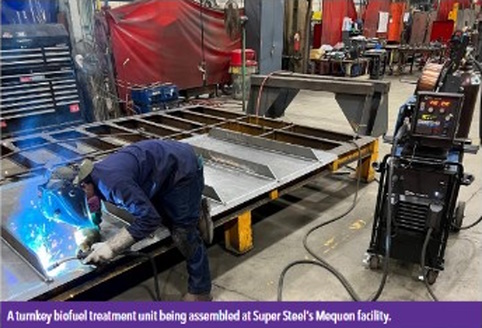
Super Steel serving new industries with full suite of metal fabrication services.
SURE, original equipment manufacturers could choose to make their own components in-house, but Mequon-based metal fabricator Super Steel is betting it can do it more efficiently and at a lower cost.
Super Steel was founded in 1923 with the goal of manufacturing a new kind of metal basement window, along with fireproof windows and doors. Super Steel would eventually go on to make everything from grain silos and switchboards to bombs used in World War II, and it continues to make components for the locomotive industry.
While the manufacturer has roots in the locomotive business, Super Steel recently entered two new emerging industries that its leadership team sees as integral to future success. Super Steel now makes parts that are used within data centers and for cloud computing, along with parts that are used by biofuel, wastewater, gas and oil companies looking to become more environmentally friendly.
“It’s kind of fun to be a metal-based manufacturer but play into the technological side of the world,” said Paul Luber, chairmen of the board at Super Steel.
The company made its entrance into the green movement in 2019 with the acquisition of Knox, Indiana-based Sabre Manufacturing. That business was moved to Wisconsin, and Super Steel began making parts for biofuel generators, which turn waste into fuel, along with components that go into wastewater treatment systems. At around the same time, Super Steel began making parts used within data centers.
“Everything is becoming cloud-based, from your video games to how Facebook saves your data,” said Stephan Achs, president and chief executive officer of Super Steel.
Outside of these two new categories of business, Super Steel’s core clients include Fortune 1000 companies in the construction, transportation and mining industries.
Mining is an example of another industry looking to leverage modern technology, and Super Steel has been working closely with its clients to help support that transition. One of the manufacturer’s contracts involves making plug-in, electric, autonomous mining vehicle modules. Those modules are then put together offsite by Super Steel’s client, eventually ending up on an autonomous dump truck.
“The people we’re working with – they’re global, monster companies – they’re looking at autonomous machines that are also electric. They’re not using diesel engines,” said Achs.
Super Steel wants to become a key partner to its clients by helping them design and optimize their metal parts so that they are cheaper and more efficient. The manufacturer provides a full suite of services including cutting, forming, bending, welding and painting/coating.
“We complete a process that literally begins with steel being brough in and ends with a machine being driven out of here, and everything in between” said Achs. “These are products that range between 5,000 and 40,000 pounds. We can do it and do it in a serial production mode.”
The company’s cutting and forming processes are becoming increasingly automated to keep up with increasing demand from customers.
Achs said Super Steel is spending millions on new technology for the shop floor. For example, computer-controlled welding machines. As an employee is welding, the machine monitors the amount of power and feed being used.
“You walk on our shop floor, and you see traditional manufacturing. But the parts aren’t going into that perceived rusty-industrial-smokestack world. It’s going into modern technology,” said Luber.
Super Steel moved into it’s current facility in Mequon two years ago. The 30-acre campus currently houses two buildings separately by an open yard. When the company needs more space, the two buildings will be connected into one structure. Before Super Steel reaches that milestone, Achs is more concerned with “growing north” by adding second and third shifts.
Super Steel currently employs approximately 200 people and is looking to add another 25 people in the next six months. By the end of next year, up to 50 new employees could be added.
“The business is there for us,” said Achs. “Together with automation and that second shift, we can please a lot more customers, or (please) our current customers a lot more.”

